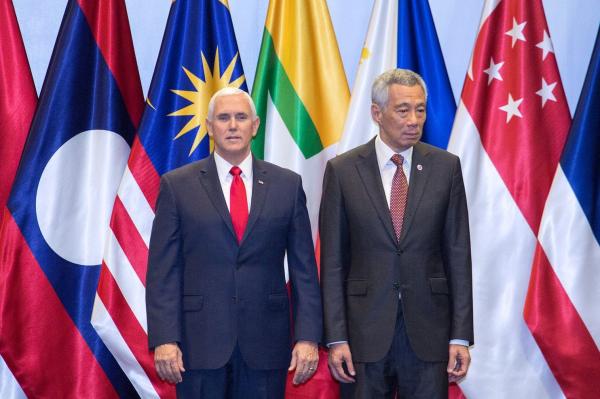
Columnist
November 15
It’s easy to get distracted by the circus of the Trump presidency. But what is its larger effect? For an answer to that question, take a look at three gatherings this week on the other side of the planet.
Attended by all of the major Asian countries, the Association of Southeast Asian Nations (ASEAN) and East Asia summits in Singapore and the Asia-Pacific Economic Cooperation (APEC) conference in Papua New Guinea are particularly important, because countries in the region are trying to navigate the once-in-a-lifetime power shift taking place: the rise of China. For this, it is crucial that they understand the role of the world’s current superpower, the United States.
But the president of the United States is MIA. Donald Trump chose to skip the summits and send Vice President Pence in his place. Yet China’s Xi Jinping, Russia’s Vladimir Putin and India’s Narendra Modiare all visiting either Singapore or Papua New Guinea, while Japan’s Shinzo Abe and South Korea’s Moon Jae-in are traveling to both. Really, everyone except President Trump is going.
A persistent complaint from Asian countries has been that while the United States worries about the rise of China — as Pence did in his speech at the ASEAN summit — it is abandoning the field to Beijing. It does not take the time to attend meetings, shape the agenda, shore up its alliances or deepen its ties in the region. Trump’s continued lack of interest will only feed this fear.
We are seeing the Trump effect in the retreat on trade in Asia. The two mechanisms for greater prosperity and cooperation that were moving toward completion in the region had been the Trans-Pacific Partnership (TPP) and the Regional Comprehensive Economic Partnership (RCEP) . Trump pulled the United States out of the TPP, undermining the pact’s goal of giving Asian countries an alternative to a Chinese-dominated system. The RCEP, which includes China, is also meant to open up Asian economies and increase commerce and contact in the region. But after 24 rounds of negotiations, momentum appears to have slowed, perhaps even stalled.
India is trying to protect its market from Chinese imports, other countries are trying to keep India’s service industries out and everyone can take solace that this is all simply an echo of what the world’s superpower, the United States, is doing in its own trade negotiations.
I’ve written before, and continue to believe, that the Trump administration has a valid point about China’s abuse of the trading system and is right to get tough with Beijing. But it is grossly mistaken in its instinctive opposition to trade, repeatedly voiced by the president. “If we didn’t trade, we’d save a hell of a lot of money,” Trump said in a speech in July, a statement that is simply false. According to calculations by Gary Hufbauer and Lucy Lu of the Peterson Institute for International Economics , the expansion of trade since 1950 increased U.S. gross domestic product to the tune of $2.1 trillion in 2016. That is equivalent to a gain of $7,014 per person, or $18,131 per household.
To watch India’s government now try to protect its markets and raise tariffs is a sad case of a country that appears to have forgotten its own history. India has decades of experience with high tariffs, which were designed to give its domestic industries a boost. The result was uncompetitive companies, shoddy products, widespread corruption and economic stagnation. Then, in the early 1990s, it slashed tariffs and red tape, ushering in three decades as the world’s second-fastest-growing large economy, lifting more than 150 million people out of extreme poverty. Does it really want to try to make Indian socialism great again?
Few ideas have been as thoroughly tested through history as the notion that trade raises a country’s income and living standards. It can also create habits of cooperation, even peace, as it has done in Europe and as it might help do in Asia. American leaders understood that for decades, until now. In 1988, President Ronald Reagan warned, “We should beware of the demagogues who are ready to declare a trade war against our friends — weakening our economy, our national security and the entire free world — all while cynically waving the American flag. The expansion of the international economy is not a foreign invasion; it is an American triumph, one we worked hard to achieve, and something central to our vision of a peaceful and prosperous world of freedom.”



